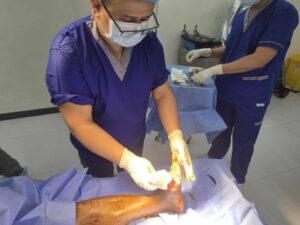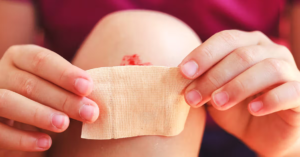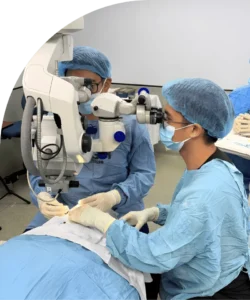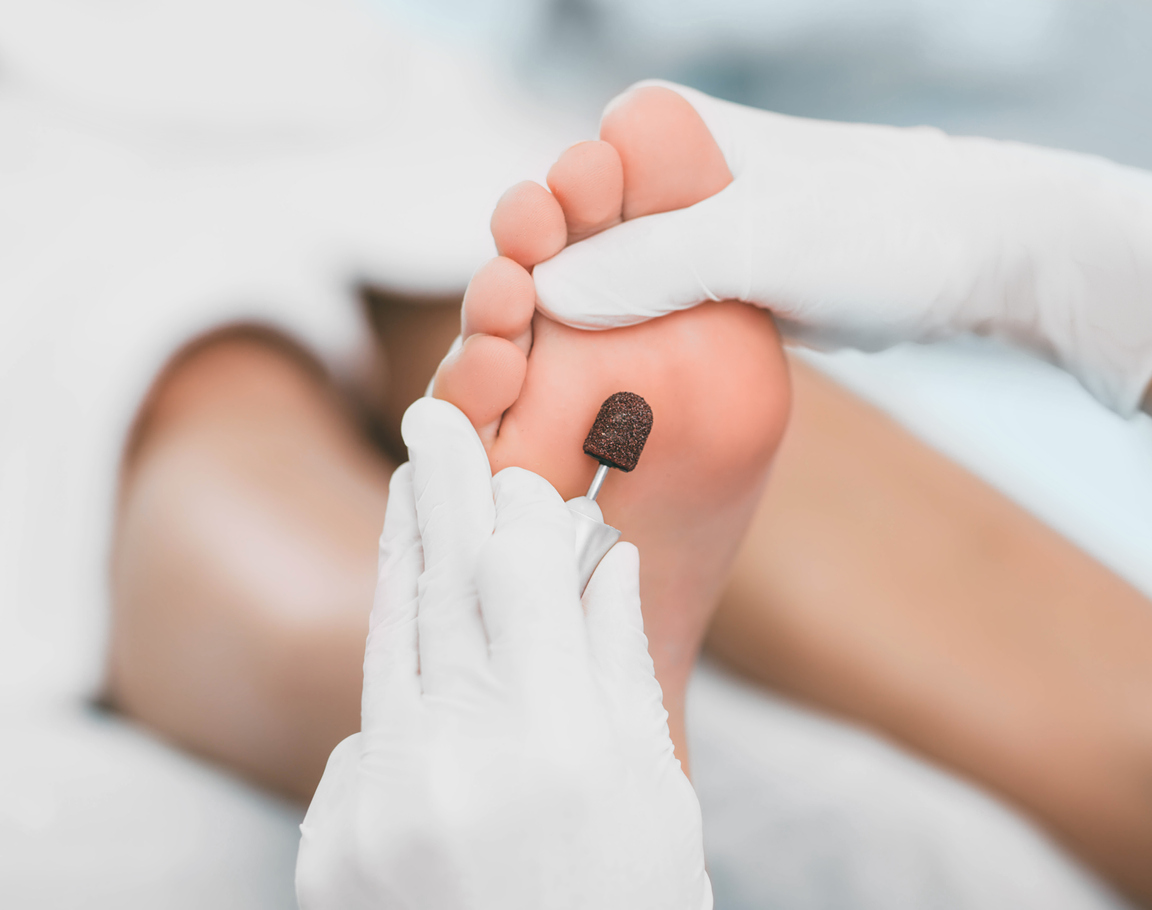Non-healing foot wounds are a serious concern for individuals living with diabetes. Poor circulation, nerve damage, and increased susceptibility to infection make diabetic patients particularly vulnerable to foot ulcers that resist healing. Orthopedic intervention is essential to prevent complications, preserve tissue, and restore mobility. At Tec Orthopedics, patients receive specialized care designed to address these challenges and promote long-term foot health.
Understanding Non-Healing Foot Wounds
Non-healing foot wounds often develop when minor injuries fail to recover due to underlying diabetic complications. Peripheral neuropathy can cause loss of sensation, leading patients to overlook small cuts or blisters. Reduced blood flow limits the delivery of oxygen and nutrients necessary for healing, while elevated blood sugar levels encourage bacterial growth and infection.
If left untreated, these wounds can deepen and spread, affecting muscles, tendons, or even bones. Diabetic patients are at heightened risk for severe infections, tissue necrosis, and in extreme cases, amputation. Timely orthopedic evaluation and intervention are critical for mitigating these risks.
Role of Orthopedic Specialists in Wound Management
Orthopedic specialists play a crucial role in managing non-healing foot wounds. Their primary goals include controlling infections, preserving tissue integrity, and restoring functional mobility. This specialized care is particularly important for patients who struggle with daily activities due to pain or limited movement.
Orthopedic care involves evaluating the wound, assessing circulation, and identifying underlying bone or joint involvement. Specialists design treatment plans that not only address the current wound but also prevent future complications. By combining surgical and non-surgical approaches, orthopedic intervention supports the body’s natural healing process while maintaining mobility and independence.
Diagnostic Approach
Effective orthopedic treatment begins with a detailed assessment. This process includes evaluating the size, depth, and condition of the wound, as well as assessing blood flow and nerve function in the affected area. Diagnostic imaging such as X-rays or MRI scans may be used to detect bone infections, structural deformities, or other underlying issues.
Laboratory tests help determine infection severity and guide antibiotic therapy. Orthopedic specialists at Tec Orthopedics develop personalized treatment plans based on these assessments, ensuring each patient receives care tailored to their specific condition and needs. Accurate diagnosis is essential to preventing worsening of the wound and supporting optimal healing.
Treatment Options
Non-Surgical Interventions: Non-surgical options form the foundation of orthopedic treatment for non-healing foot wounds in diabetes. Wound care techniques include proper cleaning, specialized dressings, and debridement to remove dead or infected tissue. Offloading devices such as custom orthotics, specialized footwear, or casts help redistribute pressure away from the wound, promoting faster healing.
Physical therapy and guided exercises may also be recommended to improve blood circulation, strengthen muscles, and support mobility. Medication management, including targeted antibiotics, helps control infections and prevent complications. Non-surgical care is often combined with close monitoring and regular follow-up visits to ensure progress.
Surgical Interventions: Surgical interventions are sometimes necessary when non-surgical methods are insufficient. Procedures may include debridement, which removes damaged tissue and reduces infection risk, or tissue reconstruction to restore healthy skin and soft tissue coverage. In certain cases, minimally invasive procedures may be performed to correct underlying structural issues contributing to the wound.
Orthopedic specialists may also address bone or joint complications through surgery, ensuring that the wound can heal properly while preserving foot functionality. Surgery is carefully planned and personalized to each patient’s needs, minimizing risk and maximizing healing potential.
Recovery and Rehabilitation
Recovery following orthopedic treatment varies depending on the type and severity of the wound, as well as the interventions used. Patients typically follow a structured rehabilitation plan that includes wound care, mobility support, and lifestyle adjustments to promote healing.
Regular follow-up appointments allow orthopedic specialists to monitor progress, adjust treatments as necessary, and prevent recurrence. Long-term management may involve customized footwear, activity modifications, and ongoing monitoring for early signs of new wounds. This comprehensive approach ensures that patients not only recover from existing wounds but also maintain foot health over time.
Why Choose Tec Orthopedics
Tec Orthopedics stands out for its patient-centered care and expertise in managing diabetic foot wounds. Our orthopedic specialists combine extensive knowledge of musculoskeletal conditions with specialized techniques for diabetic patients. Advanced technologies, thorough diagnostics, and personalized treatment plans allow patients to achieve optimal outcomes.
The team prioritizes preserving mobility, preventing infection, and supporting overall quality of life. Each patient receives care tailored to their condition, goals, and lifestyle, ensuring effective healing and long-term protection against further foot complications.
Patient Success Stories
Many patients with non-healing foot wounds have achieved significant improvement through orthopedic treatment at Tec Orthopedics. One patient experienced a severe ulcer that failed to heal for months despite home care and medications. After thorough evaluation, the orthopedic team implemented a combination of debridement, offloading devices, and a tailored rehabilitation plan. Within weeks, the wound showed measurable improvement, and the patient regained the ability to walk comfortably and perform daily activities.
These success stories highlight the effectiveness of orthopedic treatment in managing diabetic foot wounds and restoring mobility, independence, and confidence.
Takeaway
Orthopedic treatment for non-healing foot wounds in diabetes is vital for preventing serious complications, preserving tissue, and restoring mobility. Patients receive care that addresses both immediate wound management and long-term foot health. Tec Orthopedics combines advanced techniques, experienced specialists, and personalized care to ensure patients regain function, prevent infections, and maintain an active lifestyle. Early intervention and consistent follow-up care make a significant difference in achieving positive outcomes and protecting overall well-being.
Frequently Asked Questions (FAQ)
1. How do orthopedic specialists treat non-healing foot wounds in diabetes?
Treatment involves a combination of infection management, wound care, non-surgical therapies, and surgical interventions when necessary. Each plan is personalized to promote healing and prevent complications.
2. Do I need a referral to see a specialist at Tec Orthopedics?
Referrals are helpful but not always required. Patients can contact Tec Orthopedics directly to schedule a consultation.
3. What non-surgical treatment options are available?
Options include wound care, offloading devices, orthotics, physical therapy, and medications to control infection and support healing.
4. How long does recovery take after orthopedic treatment?
Recovery varies depending on the procedure and individual patient factors. The orthopedic team provides detailed guidance and follow-up care to optimize healing.
5. Can Tec Orthopedics prevent future complications from diabetic foot wounds?
Yes. Through monitoring, lifestyle guidance, and personalized treatment, the team helps reduce the risk of recurrence, infections, and tissue damage.
6. How can I schedule an appointment?
Appointments can be made through Tec Orthopedics’ online booking system or by contacting affiliated hospitals directly.
7. Does Tec Orthopedics accept insurance?
Yes. The clinic works with multiple insurance providers and assists patients in understanding coverage and costs.
8. What sets Tec Orthopedics apart from other clinics?
Tec Orthopedics offers personalized, evidence-based care with a focus on preserving mobility, reducing pain, and improving overall quality of life for patients with diabetic foot wounds.










